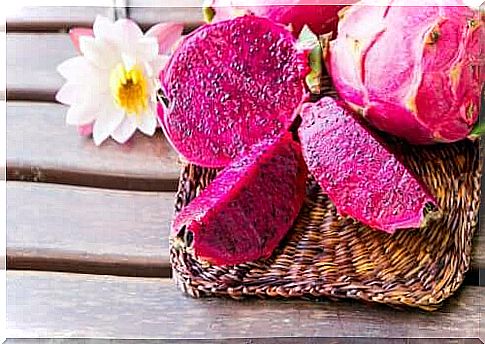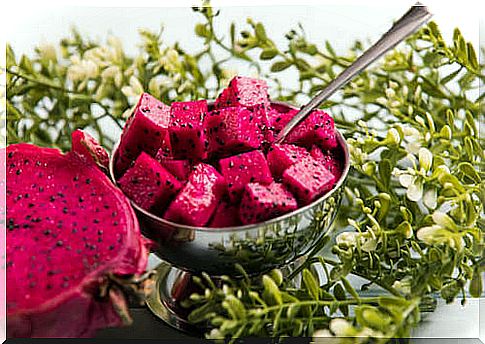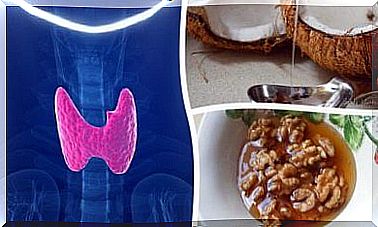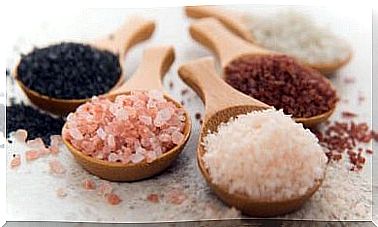Pitaya, Or Dragon Fruit – Get To Know It Better

Pitaya, also known as “dragon fruit”, is a highly valued ornamental plant.
Despite its exotic appearance, it has a taste similar to many other fruits.
Pitaya – Properties and Health Benefits
The dragon fruit has aroused the interest of science in recent years due to its high nutrient content.
Antioxidant properties
This is one of the main positive effects of drinking pitaya.

Prebiotic oligosaccharides
Part of pitaya’s nutrients are carbohydrates.
Pitaya strengthens the immune system
The body’s ability to deal with pathogens depends on certain dietary factors. In this way, the cells, including the cells of the defense apparatus, have all the nutrients necessary for optimal functioning.
Experts emphasize that the role of vitamin C and zinc, which are present in the pitaya fruit, stands out. Also vitamin A (in this case beta-carotene, one of its precursors).
This nutrient has the ability to prevent infection, and ascorbic acid supports various cellular functions of the innate and acquired immune systems. In addition, a large proportion of these cells are found in the lymphoid tissue associated with the intestine.
The intestinal microbiota interacts with them, so all prebiotic foods keep it in good condition and facilitate this positive effect on the body’s defenses.
Increases iron intake
The dragon fruit is one of the few fresh fruits that provides us with a significant amount of iron. As we will see later, its nutritional composition is 1.9 mg per 100 grams of iron, which is approximately 10% of the required daily intake of this nutrient. The presence of vitamin C facilitates its absorption.
Remember about fruit in your diet
It is important to emphasize the value of pitaya as part of a fruit group. Most of them have positive nutritional properties. Including them in your daily diet has a positive overall effect on health and well-being.
Eating 3 to 5 servings of fruit and vegetables a day is associated with a lower incidence of obesity, certain types of cancer, and risk factors related to cardiovascular problems such as blood pressure. It also improves the condition of the intestinal microflora.
Nutritional composition
All the nutritional properties of pitaya are due to some of its ingredients. Its nutritional value is similar to that of most fruits with a high content of water, fiber and vitamins. The detailed composition per 100 grams of fruit is as follows:
- Water: 87 grams.
- Protein: 1.1 grams.
- Fat: 0.4 grams.
- Carbohydrates: 11 grams.
- Fiber: 3 grams.
In addition, some B vitamins, such as B1, B2 and B3, stand out in its composition. It also contains an unusually large amount of vitamin C and minerals such as calcium, iron, phosphorus and zinc. Finally, it is worth paying attention to the presence of phytonutrients such as lycopenes (in red flesh varieties), carotenes and phenols.
How to choose and eat pitaya

We should always choose a bright red pitaya. If they are green they are not yet ripe. Some spots on the skin of the fruit are normal, but if there are many, it is too ripe.
It is cut in half along the fruit with a sharp knife. The flesh can be separated with a spoon, just like when slicing an avocado. It is important to make sure that no piece of leather is left as it is not edible. After peeling and cutting it, you can try to prepare it in various ways. We can do the following:
- Dice and eat alone or with other fruit.
- Add it to salads.
- Drink in juices or smoothies along with other fruits. You can add yogurt or milk to it.
Pitaya is an exotic fruit with great nutritional value
There are many benefits to the body for the importance of introducing fruit into your daily diet. One of these fruits may be pitaya. Undoubtedly, one of the most effective we can find in the store.
It is light, provides fiber and a large amount of vitamins and minerals. Its consumption has a positive effect on the prevention of chronic diseases, improves the condition of the intestinal microflora and strengthens the immune system.









